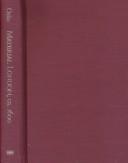| Listing 1 - 3 of 3 |
Sort by
|
Book
ISBN: 1283898888 0812208455 Year: 2000 Publisher: Philadelphia : University of Pennsylvania Press,
Abstract | Keywords | Export | Availability | Bookmark
 Loading...
Loading...Choose an application
- Reference Manager
- EndNote
- RefWorks (Direct export to RefWorks)
When the medievals spoke of "last things" they were sometimes referring to events, such as the millennium or the appearance of the Antichrist, that would come to all of humanity or at the end of time. But they also meant the last things that would come to each individual separately-not just the place, Heaven, Hell, or Purgatory, to which their souls would go but also the accounting, the calling to reckoning, that would come at the end of life. At different periods in the Middle Ages one or the other of these sorts of "last things" tended to be dominant, but both coexisted throughout. In Last Things, Caroline Walker Bynum and Paul Freedman bring together eleven essays that focus on the competing eschatologies of the Middle Ages and on the ways in which they expose different sensibilities, different theories of the human person, and very different understandings of the body, of time, of the end. Exploring such themes as the significance of dying and the afterlife, apocalyptic time, and the eschatological imagination, each essay in the volume enriches our understanding of the eschatological awarenesses of the European Middle Ages.
Eschatology --- History of doctrines --- European History. --- History. --- Medieval and Renaissance Studies. --- Religion. --- Religious Studies. --- World History.
Book
ISBN: 1283212110 9786613212115 081220381X Year: 2000 Publisher: Philadelphia : ©2000 University of Pennsylvania Press,
Abstract | Keywords | Export | Availability | Bookmark
 Loading...
Loading...Choose an application
- Reference Manager
- EndNote
- RefWorks (Direct export to RefWorks)
From 1211 until its loss to the Ottomans in 1669, the Greek island we know as Crete was the Venetian colony of Candia. Ruled by a paid civil service fully accountable to the Venetian Senate, Candia was distinct from nearly every other colony of the medieval period for the unprecedented degree to which the colonial power was involved in its governance. Yet, for Sally McKee, the importance of the Cretan colony only begins with the anomalous manner of the Venetian state's rule. Uncommon Dominion tells the story of Venetian Crete, the home of two recognizably distinct ethnic communities, the Latins and the Greeks. The application of Venetian law to the colony made it possible for the colonial power to create and maintain a fiction of ethnic distinctness. The Greeks were subordinate to the Latins economically, politically, and juridically, yet within a century of Venetian colonization, the ethnic differences between Latin and Greek Cretans in daily material life were significantly blurred. Members of the groups intermarried, many of them learned each other's language, and some even chose to worship by the rites of the other's church. Holding up ample evidence of acculturation and miscegenation by the colony's inhabitants, McKee uncovers the colonial forces that promoted the persistence of ethnic labeling despite the lack of any clear demarcation between the two predominant communities. As McKee argues, the concept of ethnic identity was largely determined by gender, religion, and social status, especially by the Latin and Greek elites in their complex and frequently antagonistic social relationships.Drawing expertly from notarial and court records, as well as legislative and literary sources, Uncommon Dominion offers a unique study of ethnicity in the medieval and early modern periods. Students and scholars in medieval, colonial, and postcolonial studies will find much of use in studying this remarkable colonial experiment.
Ethnicity --- History. --- Crete (Greece) --- Ethnic relations --- History --- European History. --- Medieval and Renaissance Studies. --- World History.

ISBN: 0812217217 1283899302 0812208390 Year: 2000 Volume: *6 Publisher: Philadelphia : University of Pennsylvania Press,
Abstract | Keywords | Export | Availability | Bookmark
 Loading...
Loading...Choose an application
- Reference Manager
- EndNote
- RefWorks (Direct export to RefWorks)
Between 1500 and 1700, London grew from a minor national capital to the largest city in Europe. The defining period of growth was the period from 1550 to 1650, the midpoint of which coincided with the end of Elizabeth I's reign and the height of Shakespeare's theatrical career.In Material London, ca. 1600, Lena Cowen Orlin and a distinguished group of social, intellectual, urban, architectural, and agrarian historians, archaeologists, cultural anthropologists, and literary critics explore the ideas, structures, and practices that distinguished London before the Great Fire, basing their investigations on the material traces in artifacts, playtexts, documents, graphic arts, and archaeological remains.In order to evoke "material London, ca. 1600," each scholar examines a different aspect of one of the great world cities at a critical moment in Western history. Several chapters give broad panoramic and authoritative views: what architectural forms characterized the built city around 1600; how the public theatre established its claim on the city; how London's citizens incorporated the new commercialism of their culture into their moral views. Other essays offer sharply focused studies: how Irish mantles were adopted as elite fashions in the hybrid culture of the court; how the city authorities clashed with the church hierarchy over the building of a small bookshop; how London figured in Ben Jonson's exploration of the role of the poet.Although all the authors situate the material world of early modern London-its objects, products, literatures, built environment, and economic practices-in its broader political and cultural contexts, provocative debates and exchanges remain both within and between the essays as to what constitutes "material London, ca. 1600."
Material culture --- London (England) --- History --- 17th century --- England --- 16th century --- Culture --- Folklore --- Technology --- Cultural Studies. --- European History. --- History. --- Medieval and Renaissance Studies. --- World History.
| Listing 1 - 3 of 3 |
Sort by
|

 Search
Search Feedback
Feedback About
About Help
Help News
News